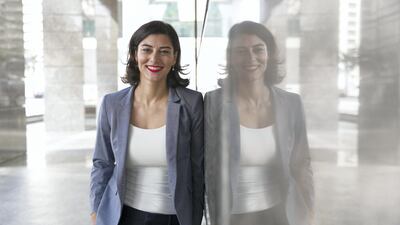Two years ago, Patricia Letayf was working in Dubai as a Middle Eastern political risk analyst. Today this compassionate businesswoman has shifted gear and is running a start-up to turn regional refugees into self-motivated, self-sustaining entrepreneurs.
Following her graduation from Tufts University in Massachusetts with a degree in international relations and economics, Lebanese-American Ms Letayf, 28, headed to Dubai to work for almost three years as an analyst focusing on Iraq and North Africa.
“I consider myself a political junkie and political science nerd, so a job doing Middle Eastern political analysis all day long was not something I could turn down,” she says.
Over time, though, she began to realise that, while her interest and passion in the region “never wavered”, her priorities were shifting into the world of aid. But her role now as co-founder and director of operations at Five One Labs, a start-up incubator for refugees, is not a “complete shift”, she says.
“You cannot ignore politics in the Middle East,” she says. “You need a profound understanding for developmental solutions in a very specific context so I took what I already knew of governance and decision-making and went back to school.”
It was while doing her master’s in public administration (MPA) at New York’s Columbia University that Ms Letayf met her Five One Labs co-founders. Alice Bosley and Sophia Burton. The name Five One comes from the 1951 United Nations refugee convention that gave refugees the right to work, and the company launched just six months ago.
_______________
Read more:
Tough times spur spirit of entrepreneurialism
Legal employment gives Syrians in Jordan a lifeline
Amsterdam hotels gives Syrian refugees a sense of hope
_______________
Launching in Erbil, in the Kurdistan region of Iraq, Five One Labs ran its first pilot in March and April with 14 entrepreneurs, while 300 aspiring entrepreneurs took part in its summer start-up festival.
The organisation kicked off a three-month training, mentorship, funding and network community “to foster social cohesion and inclusion” last month. Training in soft skills such as leadership, resilience, self-confidence and communication is particularly popular, Ms Letayf says.
“One of the most challenging things refugees face is access to employment,” says Ms Letayf, who visited Dubai last month to speak at Naseba Global WIL Economic Forum.
There are a lot of barriers for refugees, she says - “the right to work, bias in the workplace based on ethnicity, language or religion, or even that they do not have the skills to match the labour market. So jobs are available, but not the sort they fit (in).
“Entrepreneurship solves lots of these problems. It gives a way to use skills that a person already has, in ways that benefit them. It encourages people to look at challenges and solve them themselves - that is what entrepreneurship is. It humanises them.”
The humanitarian aid system in place now for refugees, to “hand money over” and assume that is enough for refugees to make it on their own, is not sustainable in the longer term, Ms Letayf believes.
The United Nations estimates that there are 22.5 million refugees in the world - five million of whom are Syrian - and that 84 per cent of all those exiles are in developing regions of the world such as Lebanon, Jordan and Turkey.
The Syrian population, Ms Letayf says, is the “most educated we’ve seen”. “They are an opportunity, not a burden - not just educated, but technology-savvy.”
Some 38 per cent of Syrian refugees in Europe have a degree, yet 87 per cent remain unemployed, according to US think tank the Council on Foreign Relations.
Alexander Betts, director of the Refugee Studies Centre at Oxford University, has said that a “paradigm shift” is needed to give refugees “sustainable access to jobs and education” and to “participate in the economy” - just what Five One Labs aims to provide.
“Entrepreneurship is a way to overcome some of the negative perceptions people have of refugees - that they are taking advantage of scarce resources,” Ms Letayf says.
One refugee Five One Labs is working with, Baghdad entrepreneur Hadi, has been displaced three times, attending several universities before finally graduating with an architecture degree.
After a nine-month coding boot camp course, he is building his own platform to provide low-cost tutoring for school children and is now connected to people who have provided seed funding for his business. Another, Peru, has launched a medicine delivery service.
“There is such a huge desire to give back in Kurdistan and take the future by the reins,” says Ms Letayf. In the Middle East, she believes, there is a “big reliance” on government employment, but young people, facing high unemployment, are looking more to volunteering and internships as stepping stones to entrepreneurship. Now is the time, she says, for those in the Middle East to get more involved in mentorship, to help refugees in the region.
The average time for a refugee to be displaced from their home is a staggering 17 years. “That means it is important to rebuild their lives with dignity,” says Ms Letayf. “If someone is displaced for that long, we want to integrate them into the local community or society, and cultivate their skills in a way that will benefit them - and the community.”

